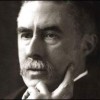Quotations by:
Housman, A. E.
And, what is worse, the reader often shares the writer’s prejudices, and is far too well pleased with his conclusions to examine either his premises or his reasoning. Stand on a barrel in the streets of Bagdad, and say in a loud voice, ‘Twice two is four, and ginger is hot in the mouth, therefore Mohammed is the prophet of God’, and your logic will probably escape criticism; or, if anyone should by chance criticise it, you could easily silence him by calling him a Christian dog.
The laws of God, the laws of man,
He may keep that will and can;
Now I: let God and man decree
Laws for themselves and not for me.A. E. Housman (1859-1936) English scholar and poet [Alfred Edward Housman]
Last Poems, No. 12, l. 1-4 (1922)
Full text.
We for a certainty are not the first
Have sat in taverns while the tempest hurled
Their hopeful plans to emptiness, and cursed
Whatever brute and blackguard made the world.A. E. Housman (1859-1936) English scholar and poet [Alfred Edward Housman]
Last Poems, No. 9, st. 3 (1922)
Full text.
Here dead lie we because we did not choose
To live and shame the land from which we sprung.
Life, to be sure, is nothing much to lose;
But young men think it is, and we were young.A. E. Housman (1859-1936) English scholar and poet [Alfred Edward Housman]
More Poems, #36 (1936)
(Source)
Who made the world I cannot tell;
‘Tis made, and here am I in hell.
My hand, though now my knuckles bleed,
I never soiled with such a deed.A. E. Housman (1859-1936) English scholar and poet [Alfred Edward Housman]
More Poems, No. 19, st. 2 (1936)
Full text.
Nature, not content with denying to Mr — the faculty of thought, has endowed him with the faculty of writing.
The average man, if he meddles with criticism at all, is a conservative critic. His opinions are determined not by his reason — ‘the bulk of mankind’ says Swift ‘is as well qualified for flying as for thinking’ — but by his passions; and the faintest of all human passions is the love of truth. He believes that the text of ancient authors is generally sound, not because he has acquainted himself with the elements of the problem, but because he would feel uncomfortable if he did not believe it; just as he believes, on the same cogent evidence, that he is a fine fellow, and that he will rise again from the dead.
A. E. Housman (1859-1936) English scholar and poet [Alfred Edward Housman]
Introduction to Astronomicon of Manilius, Book 1 (1937)
Full text.

